Smilerweek.com pop-up ads are the start of a major problem on the infected computer. These ads will appear on your browser and force you to allow spam notifications. Once you click on allow button, your browser will get filled with tons of misleading pop-ups, ads, banners, offers, and fake messages. Read this guide to know how to remove Smilerweek.com virus from your computer successfully.
Threats like Smilerweek.com can get back on your PC if all associated files are not removed. So we advise you to use SpyHunter 5 Anti-malware to automatically detect and remove all threats from your computer at once.
Compatible with: Windows 11/10/8/7 (32 Bit and 64 Bit)
What is Smilerweek.com?
Smilerweek.com is a dubious computer threat categorized as a redirect virus. It is an irritating malware infection that will drive you nuts. It silently intrudes on your machine and gets stuck to your main browser. This nasty redirect malware can modify your system and browser setting to perform its illegal activities. It is designed and distributed by evil cyber criminals to make illegal profits.

It is deployed to redirect the web traffic on low-level and phishing websites to earn referral commissions. Smilerweek.com can easily redirect your searches without your consent to malicious websites. It is a risky affair because you can encounter other hateful threats on those websites. This nasty malware can infect all versions of Windows OS easily.
Smilerweek.com can contaminate Google Chrome, MS Edge, Firefox, IE, Safari, Opera, and many other commonly used web browsers. It will completely destroy your browsing experience through forced web redirections to suspicious sites. It will bombard your system with loads of misleading pop-up ads and notifications that will slow down your machine.
How does it infect your PC?
Smilerweek.com intrudes on the targeted computer through various suspicious methods. Bundled freeware software is one of the most common ways of spreading malware online. Cybercrooks often attach malicious programs to freeware software that people normally download from the Internet. When you install such a contaminated program, hidden threats automatically get installed. Always choose custom or advanced installation methods to avoid such infections.
Spam email attachments are also used for malware distribution on a massive scale. Do not open any email attachments without scanning and do not click on any suspicious links. Smilerweek.com could also get distributed via other similar threats and redirect malware. Browsing torrent or porn sites often causes such forced redirects which can result in the download of malware on your PC.
Do not download any pirated or cracked software on your system, because they often have hidden malware and threats. Sharing files on an unsafe network (peer-to-peer file sharing), illegal patches for games or fake software updates could also bring this threat to your PC.
Threat Analysis
| Name | Smilerweek.com |
| Type | Redirect Virus |
| Threat Level | High (source to distribute other harmful threats). |
| Symptoms | Users can experience changes in their browsers and excessive amounts of annoying pop-up ads. |
| Distribution | It could be distributed through spam emails, bundled freeware, porn, or torrent sites. |
| Damage | It can modify browsers, show unwanted Ads, steal personal info and bring other threats. |
| Removal | Download SpyHunter 5 Anti-Malware |
Why it is dangerous for your PC?
Smilerweek.com virus will keep throwing annoying alerts, pop-ups, ads, and banners on your computer screen while redirecting your browser to malicious websites. It can bring more threats and viruses to your computer secretly. This nasty malware can also create new registry entries for its regeneration in case it gets removed from your PC. It creates loopholes on your machine through which other threats and cyber crooks can easily invade your system.
This dubious threat can also steal your sensitive information like your online banking details, credit card number, IP address, etc. by tracking your browsing history. It can share those details with cybercriminals for making illegal profits. This can lead to identity theft or bank fraud. This nasty redirect malware can risk your system’s security and privacy. It is advised to quickly remove Smilerweek.com virus from your computer.
How To Remove Smilerweek.com
We have created a step-by-step guide for you to remove Smilerweek.com virus easily from your computer. Follow the instructions carefully to remove this threat completely from your system. Use SpyHunter 5 Anti-Malware to remove the infection automatically if you don’t want to use the Manual removal method.
Quick Summary of Removal Instructions:
- Remove Smilerweek.com with SpyHunter
- Uninstall Smilerweek.com from Control Panel
- Remove Smilerweek.com From Browser
- Reset Browser Setting to Default
- How to prevent malware attacks in future
You may have to restart your computer or browser, so Bookmark This Page by pressing the Ctrl and D buttons together before you begin the removal process.
Remove Smilerweek.com with SpyHunter
Removing threats and viruses manually from a computer can be hectic but SpyHunter 5 Anti-Malware can make this task much simpler. It can help you find and delete all kinds of threats like Trojans, Ransomware, Spyware, Adware, PUPs, etc. easily from your PC. You just have to install the application and run a new scan on your PC.
It will easily find Smilerweek.com virus and all other hidden threats and remove them efficiently in no time. You will also get 24X7 customer support and Custom Malware removal via one-on-one Spyware HelpDesk support. SpyHunter can block threats in real time via its advanced System Guard feature. It is compatible with your anti-virus application and fills the security gaps to provide the best protection.
How SpyHunter 5 Anti-Malware Works
- First, you will need to download the SpyHunter Installer on your computer. The below download button will take you to the download page in a new tab, so this guide will be still accessible to you.
Threats like Smilerweek.com can get back on your PC if all associated files are not removed. So we advise you to use SpyHunter 5 Anti-malware to automatically detect and remove all threats from your computer at once.
Compatible with: Windows 11/10/8/7 (32 Bit and 64 Bit)
- The SpyHunter-Installer.exe file will get downloaded on your PC. Run the installer via a double-click to start the installation and follow the instructions to complete the setup.

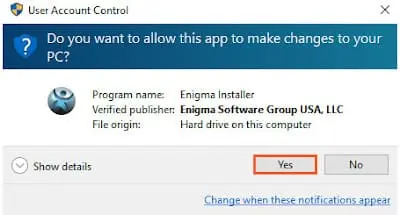
- Launch SpyHunter 5 Anti-Malware after the installation if it does not automatically starts. Now you will have to click on the Start Scan Now button to detect all hidden threats and viruses on your PC.
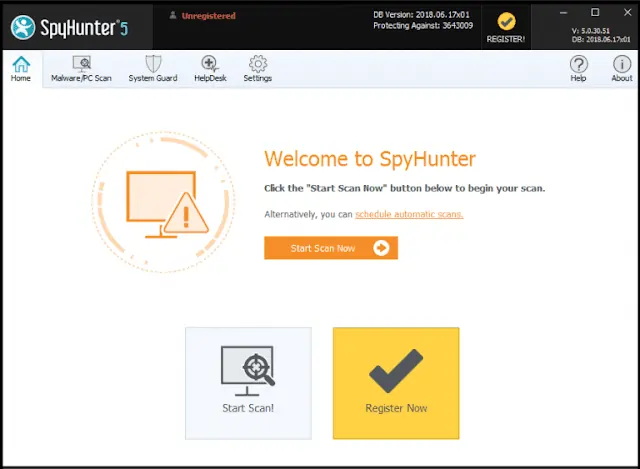
- Once you start scanning your system, wait for a few minutes. The software will run a thorough diagnostic of your PC and give you a detailed report of all the threats found on your PC.
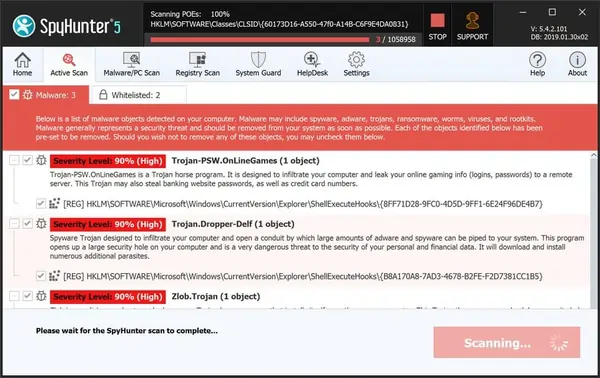
- After the scan, a complete list of all threats will be shown to you. Finally, you will just have to click on the Next button to immediately remove all the threats at once.
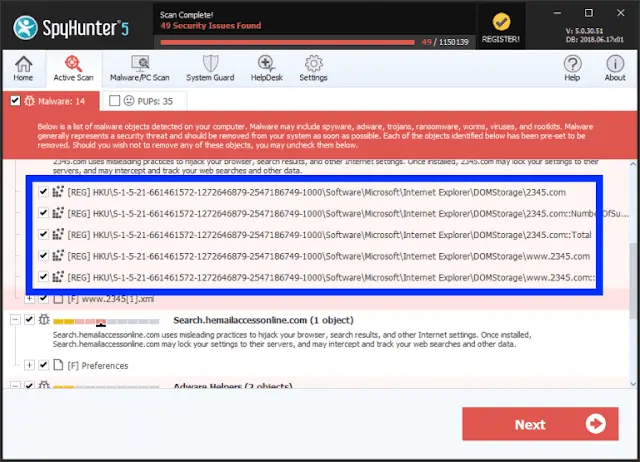
Uninstall Smilerweek.com from Control Panel
- First, you need to press and hold the Windows key and then hit the R button.
- Soon you will see the Windows Run Box on your computer screen.
- Now type or copy-paste appwiz.cpl in the run box and click the OK button.
- You will see the Programs and Features windows with a list of all installed applications.
- Find any unknown or suspicious app related to the virus and then press the Uninstall button.
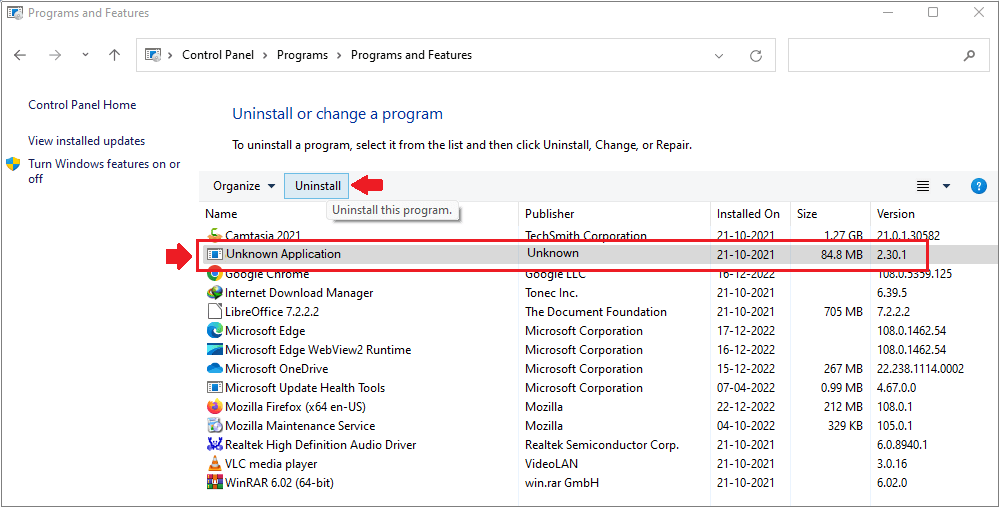
Remove Smilerweek.com From Browser
This threat tricks users into allowing push notifications by altering the browser settings. You need to reverse the changes made by this infection to stop those unwanted pop-up ads and redirects.
It will take some doing but very much possible. However, if you are using the Anti-Malware application, it will be done automatically. But still, we have created a detailed manual guide and the below steps can help you reverse the browser settings.
Google Chrome
- Go to the Google Chrome menu by clicking on the (⋮) icon from the upper right corner of the browser.
- Press on the Settings button from the right-side drop-down menu.
- Choose the Privacy and Security option from the left sidebar on the settings page.
- Now click on the Site Settings option and then open the Notifications tab.
- Here you can see the list of websites showing pop-up ads on your browser.
- Find the malicious website causing trouble, click on the (⋮) icon next to it and press the Remove button.

Mozilla Firefox
- Access the Mozilla Firefox menu by clicking on the (☰) icon from the upper right corner of firefox.
- You will see a drop-down menu there, click on the Settings option.
- Click on Privacy & Security from the left sidebar on the settings page.
- Scroll down and open the Notifications settings option on this page.
- A list of all websites with permission to show notifications on your browser will appear here.
- Select the malicious website and click on the Remove Website button.

Microsoft Edge
- Open the MS Edge menu by clicking on the (…) icon from the upper right corner of the edge browser.
- A drop-down menu will show on the right side of your browser instantly.
- Scroll down and look for the Settings option and click on it.
- Click on the Cookies and site permissions option from the left sidebar.
- Open the Notifications option to see the sites causing trouble.
- Find the malicious website, click on (…) icon and press the Remove button.
- You can do the same process with the Pop-ups and redirect settings also.

Safari Browser
- Open Safari Menu by clicking on the Safari button from the top left side right next to the apple icon.
- The browser settings menu will appear as a drop-down list instantly.
- You will have to click on the Preferences option from the list.
- Open the Website tab and then click on the Notifications option on the left side.
- You will see the list of all the websites showing notifications on this page.
- Now select the malicious site and click on the Remove button.
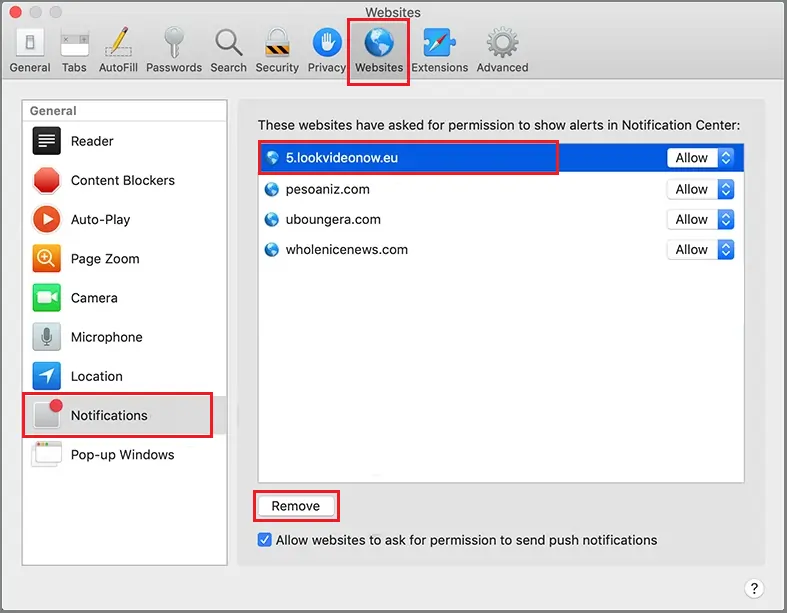
Reset Browser Setting to Default
You should also reset your browser settings to default after removing the Smilerweek.com virus. Follow the below steps to undo all the changes made by the virus to your browser settings:
Reset Google Chrome
- Open Chrome’s Menu (⋮) from the upper right corner as explained earlier.
- Find and click on the Reset and Clean up option from the left menu.
- Press the Restore settings to their original defaults option.
- Finally, click on the Reset Settings button to reset your browser.

Refresh Mozilla Firefox
- Open Firefox Menu (☰) from the upper right corner as explained above.
- You will again see the drop-down menu on the right side of your browser.
- Press the Help option from the list to open the Firefox help menu.
- Now click on the More troubleshooting information option.
- Finally hit the Refresh Firefox button to reset your browser settings.
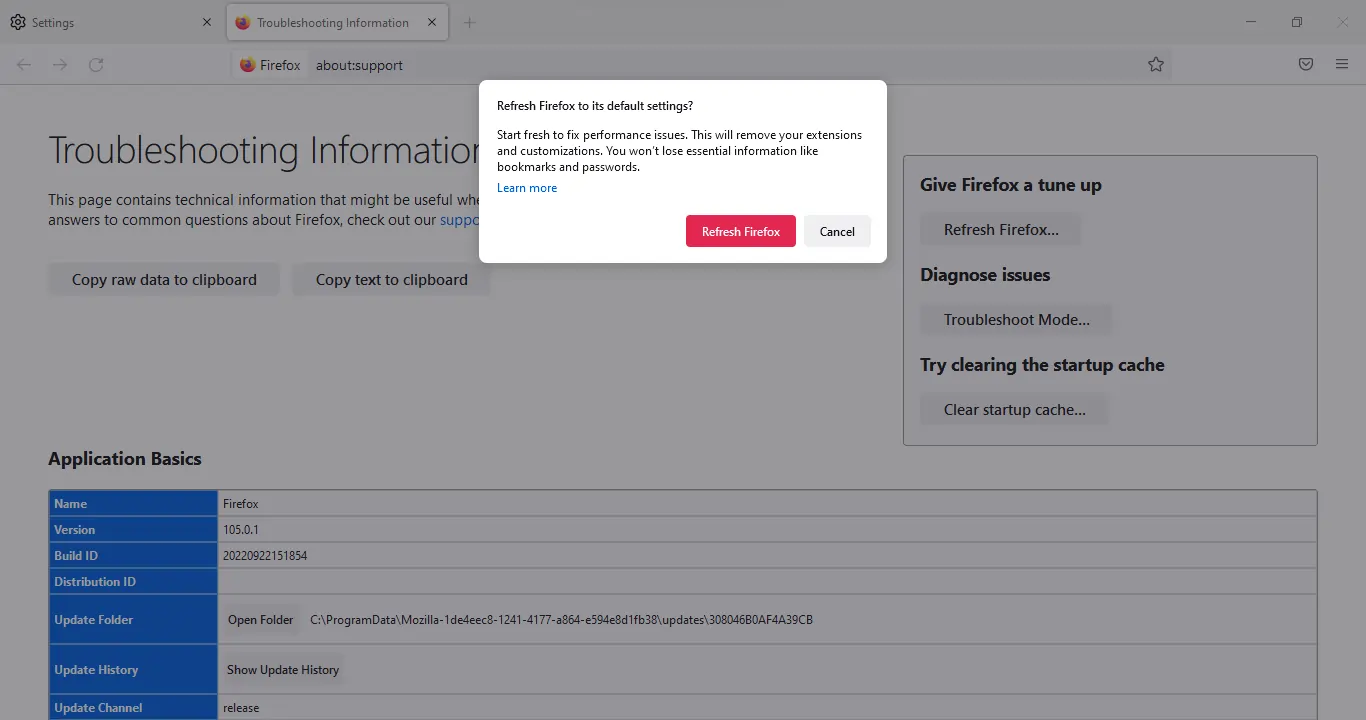
Reset MS Edge Browser
- Click on the More Tools (…) option on Microsoft Edge from the upper right corner.
- A drop-down menu will instantly appear on your browser screen.
- Find and click on the Settings option from the Edge drop-down menu.
- Click on the Reset Settings option from the left side menu.
- Hit the Restore settings to their default values option.
- Finally, press the Reset button if your browser asks for permission.
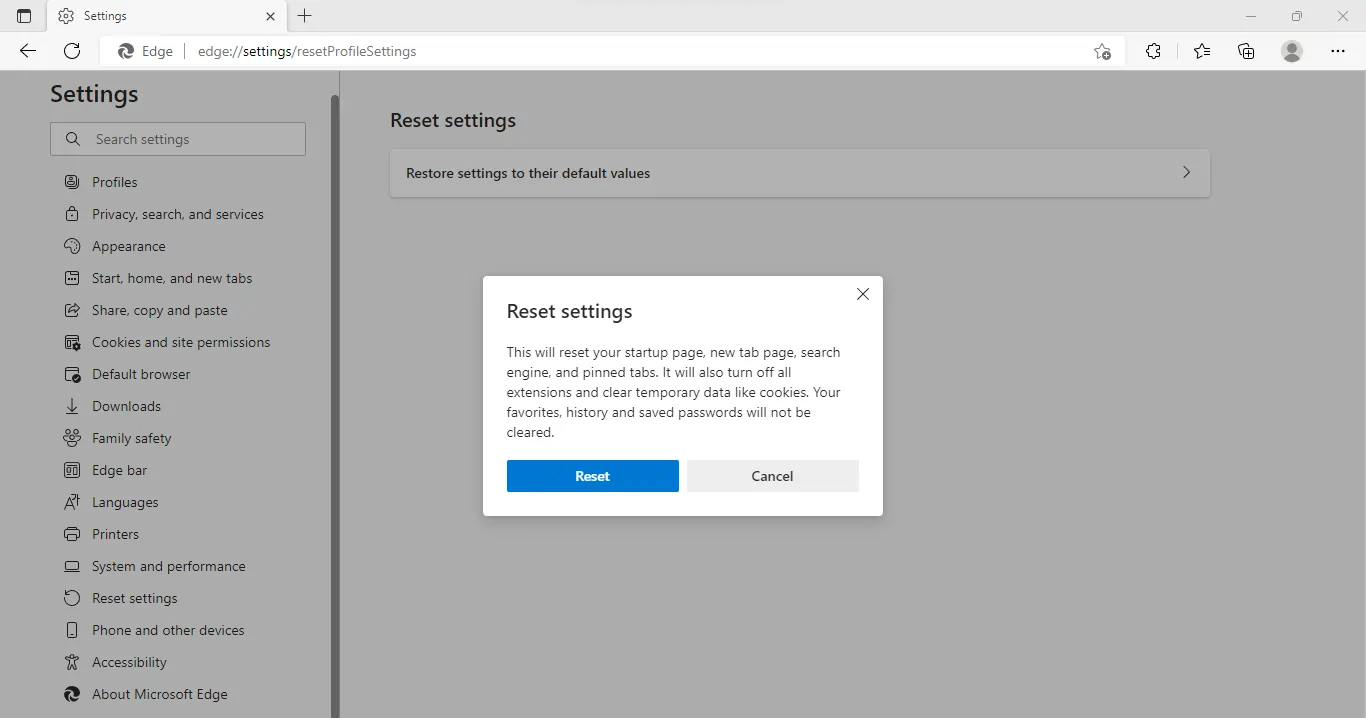
Reset Safari Browser
- Click on the Safari menu from the top of the browser right next to the Apple logo.
- You will see a drop-down menu right there when you will click on the Safari menu.
- Click on the Clear History and Website Data option from the menu.
- A new dialogue box will appear saying Clearing will remove history, cookies, and other website data.
- Finally, click on the Clear History button to clear all the data and reset your browser settings.
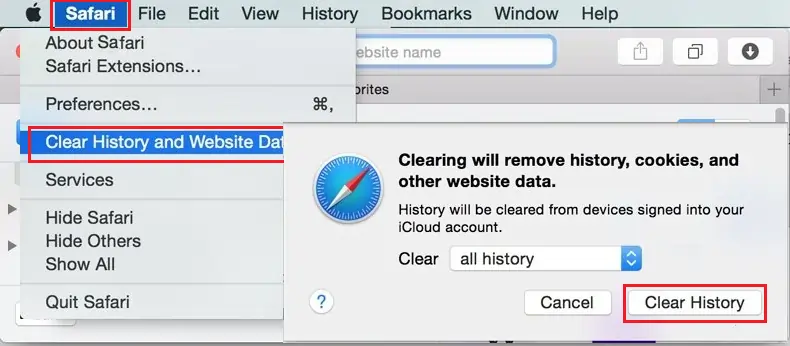
Your browser will get back to its default settings once you perform the above steps to reset your browser. Rest assured it will not delete your saved passwords or bookmarks. All the unwanted pop-ups and browser redirections should stop now.
How to prevent malware attacks in future
- Use a powerful Anti-Malware or Anti-virus program. Also, keep your security program updated to fight against the latest threats. Free Anti-virus does not offer the best protection and fails to remove dangerous threats. Do not look for cracked security programs or they will do more damage than good.
- Keep your Windows OS and other programs up to date. Updates are often launched to patch vulnerabilities that cybercriminals use to attack computer systems. So always keep your OS and programs updated. Only download updates from official sites or reliable sources.
- Only visit secured websites. Check the HTTPS and padlock icon before entering your email, password, credit card details, etc. into any site. Do not visit sites that do not have SSL security. Also, don’t forget to Enable Phishing and Malware protection in Browser.
- Do not download pirated software, games, or illegal patches. Avoid using shady sites to acquire freeware programs because they often use software bundling. Never install a program that asks you to inactivate your anti-virus software. Always choose the advanced or custom installation to avoid bundled malicious applications.
- Avoid opening spam emails from unknown senders. Cybercriminals often use spam emails to spread malware online. Always scan all the email attachments before opening them. Never click on any suspicious links with some too-good-to-be-true offers.
- Stay away from unsafe free Wi-Fi. Connecting your PC or mobile devices to unsafe public Wi-Fi is not a good idea. You can also avoid unwanted threats coming from malicious sites by using a VPN to spoof your connection.
- Back up your personal files and data. Keep regular backups of all your important data on external hard drives or cloud drives to avoid data loss in case of a ransomware attack. Also, create a system restore point on your system for security purposes.

Leave a Comment